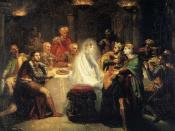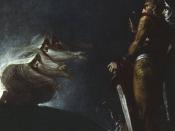The purpose of this paper is to show the actions of two characters on their mental decline. For one man, the thoughts of a terrible crime he committed in order to gain power haunted him. In the second piece, the death of a crew and complete isolation cause the mariner to lose his mind. For further explanation and reasoning, one must take a closer look at the stories involved.
The vicious and vile actions of Lady MacBeth had a direct influence on MacBeth's mental state at the end of the play. Lady MacBeth is very passionate about herself and her husband having a crown to their name. She is pleased with her husband being named Thane of Cawdor, but seeks more. She calls for the spirits to "unsex"ÃÂ her and fill her from "the crown to the toe-full of direst cruelty"ÃÂ (Shakespeare 202). This shows that she wants to abandon all feelings just so she can have power.
This attitude is pressed onto MacBeth, especially when he no long wants to kill Duncan. Lady MacBeth convinces him that it is better that way because he will gain the crown (204). Her harmful influences are also seen corrupting MacBeth when he is having regrets about murdering Duncan. She tells him to simply forget about everything that they have done wrong because they have done each terrible thing to gain power (223-24). Lastly, we see Lady MacBeth in her most pitiful display of sanity in Act Five, Scene One. She is talking about the murders and is obviously in great distress. Her driving barbarity wore her down and had a part in her husband's insanity.
The actions of the first murder, that of King Duncan, haunt MacBeth throughout the play. He knows he is seeing the vision of the blood-covered dagger. Though he knows it is not real, he still states that it led him to take Duncan's life (208-09). He sees the knife floating towards him. When he reaches for it and does not take hold of it, he Lassiter 2 says "I have thee not, and yet I see thee still . . .Or art thou but/A dagger of the mind, a false creation, /Proceeding from the heat-oppressed brain"ÃÂ (208). This is truly the first hint that he is losing his mind. He envisions the dagger floating toward him, yet knows it is not real. After the murder, MacBeth believes that no water will wash the blood from his hands. He says that the small amount of blood on his hands will turn the green seas red (211). This statement indicates that he will be troubled by his action forever. Even his insensitive wife notices that he is not well. She says to him, "constancy hath left you unattended"ÃÂ (212). Her remark does not effect MacBeth, but gives the reader insight into his state of mind.
The most convincing actions of MacBeth's insanity are during the banquet. He sees the ghost of Banquo sitting in his chair. No one else can see this vision because the murder of Banquo is resting on MacBeth's conscious. When MacBeth sees the ghost, he acts as if he had lost his mind completely. He says that if morgues and graves can't keep the dead buried, then the burial place should be in the stomachs of birds of prey (227). As MacBeth is screaming at this invisible person, this peers and guests at the feast are in disbelief. Lady MacBeth tries to concoct a story to explain his behavior, but without much luck. Finally, the ghost disappears. MacBeth gains his composure back and makes a toast to his missing companion. At that exact moment, the ghost reappears. In reaction to his, MacBeth says that he would rather be faced with vicious animals than to be haunted by the ghost of Banquo (228). This scene shows MacBeth's decreasing mental condition and his cowardly response to the ghost of his friend.
The pressures of becoming and remaining King of Scotland places tremendous pressure and strain on MacBeth. At the end of the play, we see MacBeth as a bloody and cold ruler (236-39). He has his closest friend murdered because MacBeth fears that the sons of Banquo will take over his reign as King. MacBeth is then disappointed because Fleance, Banquo's son, escaped the hostile hands of the murderers (225-26). This fear Lassiter 3 comes from the prophecies of the three witches. They tell and show MacBeth that the Kings after him will descend from Banquo (236). He is outraged because he wants his legacy to carry on.
In "The Rime of the Ancient Mariner"ÃÂ, the Albatross brings about the changes in the mariner's state of mind. At first, the Albatross signals hope and prosperity. The crew calls it "a Christian soul"ÃÂ and hails the bird. Then, when the mariner kills the Albatross, he believes he is cursed (Coleridge 468). He has killed the bird of good omen and from here on, the trip with the Albatross is downhill. Even though the crew could not verbally blame the mariner for their bad fortune, he is shown their resentment by being forced to wear the dead bird around his neck (471). Throughout the time when the crew is parched and they die, the narrator of the story is wearing a dead bird around his neck. Once the crew is dead, the mariner blessed the creatures of the sea and prayed. At that moment, the Albatross fell off and "sank like lead into the sea"ÃÂ (475). The last we hear of the Albatross is the most convincing of the mariner's mental state. He still believes that he is cursed by the blood of the bird and begs the Hermit to "shrieve"ÃÂ him and remove the blood of the Albatross (482).
While on the sea, the sees and hears very odd things that contribute to his insanity. The first thing that the mariner envisions are the "slimy things"ÃÂ crawling on the "slimy sea"ÃÂ. There are no things that actually crawl on the sea and the sea itself cannot be slimy. Next, the narrator says he sees a ship sailing towards them. He goes to extreme measures to announce this sighting but everyone is disappointed when it turns out to be a skeleton of a ship (471). As the ship passes by, the ancient mariner "sees"ÃÂ Death and Life-in-Death rolling dice for him (472). Life-in-Death wins and that is how the mariner explains why he is the only one who survived. Life-in-Death is a mixture of remorse and loneliness (Whalley 76). The loneliness is more powerful and we see it in lines 232-235, "Alone, alone, all all alone, /Alone on a wide, wide sea! /And never a saint Lassiter 4 took pity on/My soul in agony"ÃÂ (Coldridge 473). Also in this poem, we hear the narrator refer to the Southern Spirit often. The mariner believes it was this spirit that followed the ship up from the south and plagued the ship and the crew (471). Also, the Spirit is credited for moving the ship and taking over the dead bodies of the crew (477).
Another aspect that contributed to the insanity of the ancient mariner is what he witnessed his crewmates going through. The first stage is after the winds have stopped and there was no water to drink. We are told that "every tongue . . .was withered at the root"ÃÂ (471). The mariner said that the look on the men's faces never went away. He saw the "curse"ÃÂ for seven days and nights (474). The narrator sees the crew slowly die, one by one and "each turned his face with a ghastly pang, /And cursed me with his eye"ÃÂ (473). Anyone who must watch many people die will surely not be the same afterwards. However, the mariner does not realize at first that the men have died. When he does, he says "The many men, so beautiful! /And they dead did lie"ÃÂ (Whalley 76). Here, he thinks that dead men are beautiful. Then, when the rain and wind came, the mariner saw the men "groan, they stirred, they all uprose"ÃÂ (Coleridge 476). They all took to their jobs in order to keep the ship going. Strange . . . yes. Even odder is when the ship had entered the bay and the spirits of the crew rose. Their lifeless bodies were left to lie on the deck.
Both men had a murder to start off their mental decline. MacBeth stabbed Duncan and after that was not orderly. The mariner shot the Albatross with his crossbow and was on the edge for the rest of the poem. MacBeth tried to survive in his position as King by murdering even more and misusing the power he gained. In contrast, the mariner strove to live by putting up with visions, a dead bird, and a dying crew. In the end, MacBeth did not prevail. His cruelty and insanity caught up with him. The mariner, on the other hand, did survive his trip. But, we see that he appears unhealthy when speaking to the wedding guest. As one can see, the authors of both stories made their characters begin sensible and wind up in a defective state of mind.





